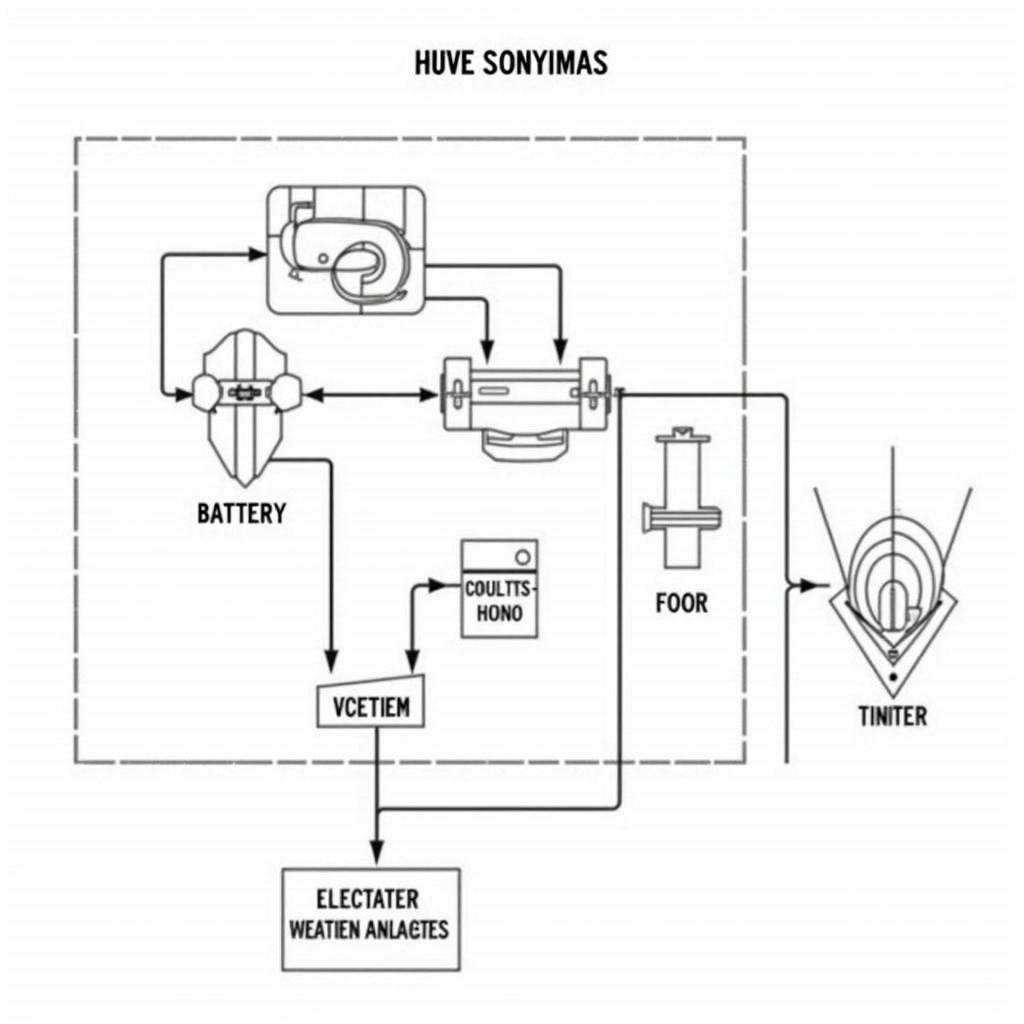Car Engine Electrical Problems can be frustrating and confusing. From a flickering headlight to a complete engine stall, electrical issues can manifest in various ways, impacting your vehicle’s performance and safety. This guide provides a comprehensive overview of common car engine electrical problems, troubleshooting tips, and maintenance advice to help you keep your vehicle running smoothly.
 Diagram of a Car Engine Electrical System
Diagram of a Car Engine Electrical System
Understanding Common Car Engine Electrical Problems
Electrical systems in modern vehicles are complex, involving numerous interconnected components. A problem with one component can often trigger a chain reaction, affecting others. Some common car engine electrical problems include:
-
Battery Issues: A weak or dead battery is often the culprit behind starting problems. Corrosion, old age, or parasitic drains can all contribute to battery failure.
-
Alternator Problems: The alternator is responsible for recharging the battery and powering the electrical system while the engine is running. A failing alternator can lead to a dead battery, dim headlights, and other electrical malfunctions.
-
Starter Motor Malfunctions: The starter motor cranks the engine to start it. A faulty starter motor can result in clicking sounds, slow cranking, or a complete inability to start the engine.
-
Wiring and Connector Problems: Loose, corroded, or damaged wiring and connectors can disrupt the flow of electricity, causing various electrical problems.
-
Sensor Failures: Modern vehicles rely on numerous sensors to monitor and control engine performance. A faulty sensor can send incorrect information to the engine control unit (ECU), leading to performance issues, warning lights, and reduced fuel efficiency.
-
Ignition System Problems: The ignition system provides the spark needed to ignite the air-fuel mixture in the cylinders. Problems with the spark plugs, ignition coils, or distributor can cause misfires, rough idling, and reduced power.
You might encounter similar issues with various car models, including those listed on our page about problems in hyundai car and solutions.
Diagnosing Car Engine Electrical Problems
Diagnosing car engine electrical problems requires a systematic approach. Here are some helpful tips:
- Visual Inspection: Check the battery terminals for corrosion, inspect wiring for damage, and examine fuses for any signs of blowing.
- Battery Testing: Use a multimeter to test the battery voltage. A fully charged battery should read around 12.6 volts.
- Alternator Testing: With the engine running, the alternator output voltage should be around 13.5-14.5 volts.
- Starter Motor Testing: Listen for clicking sounds or slow cranking when attempting to start the engine.
- Diagnostic Scanner: A diagnostic scanner can read trouble codes stored in the ECU, providing valuable clues about the source of the problem.
Why is my car having electrical problems?
Electrical problems in your car can stem from a variety of sources, ranging from a simple loose connection to a more complex issue like a faulty alternator.
What are the most common car electrical problems?
The most common car electrical problems include battery issues, alternator failure, starter motor malfunctions, and wiring or connector problems. These can manifest in symptoms like difficulty starting, dim lights, and dashboard warning lights.
How to fix car electrical problems?
Fixing car electrical problems can range from simple DIY tasks like cleaning battery terminals or replacing fuses, to more complex repairs requiring professional assistance. It’s crucial to correctly diagnose the issue before attempting any repairs.
Remember, sometimes a repair shop may not resolve the issue correctly. It’s important to understand your rights, as explained on our page about repair shop didnt fix car problem warranty. If you’re experiencing issues with your car’s informatic system and lights, restarting the car might offer a temporary solution, as detailed on our page discussing restart car lights informatic problem.
Maintaining Your Car’s Electrical System
Preventive maintenance can significantly reduce the risk of car engine electrical problems. Some key maintenance tasks include:
- Regular Battery Checks: Clean the battery terminals and check the electrolyte level periodically.
- Alternator Inspection: Have the alternator tested during routine maintenance checks.
- Wiring and Connector Inspection: Look for signs of damage, corrosion, or loose connections.
- Fuse Check: Replace any blown fuses promptly.
“Regular maintenance is key to preventing electrical problems,” says John Davis, a certified automotive technician with over 20 years of experience. “Simple checks can save you from costly repairs down the road.”
Conclusion
Car engine electrical problems can range from minor inconveniences to major headaches. By understanding the common causes, using proper diagnostic techniques, and performing regular maintenance, you can keep your car’s electrical system in top condition and avoid unexpected breakdowns. If you’re experiencing issues with a specific vehicle, like a golf cart, checking resources like our page about 2016 club car service cart problems might be helpful. For a broader understanding of vehicle reliability, our page on cars with most problems 2022 can offer insights. If you need further assistance, feel free to contact us at AutoTipPro. Our phone number is +1 (641) 206-8880 and our office is located at 500 N St Mary’s St, San Antonio, TX 78205, United States. We’re here to help you get back on the road!







Leave a Reply